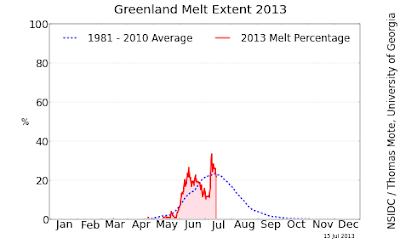I'm making a trip to Greenland in a few days by private plane. It's a single engine turbo-prop. A grade school friend -- half a century now -- is a pilot and flying us to Ilulissat. I'm excited to be going to the frontier of sea level rise. Flying north through Maine into Canada, we will have time to think where we are headed.
One hundred fifty years ago, the gentile of Washington DC toed their boots into carriages and buggies to view the battle of the Bull Run.
The chart, above, shows the anomaly in this year's ice melt. The chart is based on real-time satellite data covering the entire Greenland ice sheet, published by the National Snow and Ice Data Center. Compared to the telescopes used by the men in their top hats and ladies in their bustles at Bull Run, we have scanning electron microscopes and computers correlating data from geosynchronous orbits hundreds of miles above the earth.
We know so much and do so much with all we know, but the survival of our species likely comes down to watching the ice melt in Greenland, between your feet.
I wonder how to advise the current generation coming to their turn managing affairs of the world. We were up to the task; the Baby Boomers. Yes, the radical right made hay on the "me generation". But the right entirely avoids the social contract, the public commons, shared responsibility for the planet, and of accounting for pollution. The right is more fixed on measuring the point of conception than creation lost to forces of greed.
We've fumbled our chances to address global warming as the international security crisis it is.
Instead, we've focused -- for one reason or another -- on the low hanging fruit. I always got the point, for example, about inculcating social responsibility through recycling, but I never understood how our generation's powerful actors -- like Bill Clinton, for instance -- could use the environment in the game of politics with the GOP like a low count card and convert to a true believer on climate change when he was out of office.
It is not like these issues -- consider Big Sugar and Clinton's affiliation with the Fanjul billionaires as one example -- were unavailable for policy changes at the time he was in the White House. And I don't mean to pick on the Democrats. How many of George HW Bush's 5000 Points of Light were awarded to environmental warriors challenging Florida's cratered natural resources or fighting fossil fuel industries?
I'm asking these questions, because I don't know how to address the younger generations.
Maybe I'm missing something. In the days before and even after the battle, Gettysburg must have been serene. The quail rustled, flushed from tall grass where they were feeding. There is no cataclysmic event in climate change. No Gettysburg or Antietam. So far, no day where the tide went high and stayed there.
My family history was shaped by a cataclysmic event -- the Holocaust -- where the banality of evil destroyed millions. The storm clouds over eastern Europe had been easily readable before the gas chambers. In other words, there were no surprises in the catastrophe that Hitler unleashed. He had plenty of help.
Despite that history is backwards-looking, its illumination traces the exact outline of where we are headed. The challenge for younger generations is to know, what is the moment we are in?

2 comments:
It may be there is nothing to say to a younger generation to help because collectively -young and old - we have no idea what to do or think about our current predicament.
"The challenge for younger generations is to know, what is the moment we are in?"
This is a challenge for most I think.
I would say between 1930 - 1940 somewhere. Depending on the receiving end one is in. Of course for a regular Iraq or Afghan or Pakistani family it may feel more like 1943, the height of disorder and destruction.
A nation, with a retired leader doing water colors, and his leadership being responsible for war crimes and the death of 5 figures civilians plus over 4 millions uprooted or homeless. A nation shrugging of such facts, but neighborhoods getting all worked up wen paroles live in their neighborhood, wanting to deny them the right for a place to live and earn a living in their community, why would such a pervasive mind set start to worry about the common good?
The common good that requires us to think long term, all inclusive and just for the whole world by all segments of society.
The best one can do is live by ones enlightened conviction and speak up.
Post a Comment